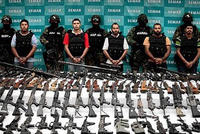-
U.S. bolsters its military capabilities in the Gulf

The United States has bolstered its military capabilities in the Gulf by stationing six stealth F-22 Raptors at the al Dafra air base, 150 miles from Iran. The F-22 is the most advanced plane in the U.S. arsenal – and also the most expensive, at about $150 million a plane. The F-22 can carry eight smart bombs which it can simultaneously direct at four different targets on the ground – and do so at supersonic speed while evading enemy’s radar.
-
-
Nebraska lawmakers look to limit police drone use
The Federal Aviation Administration says there will be around 30,000 commercial and government drones flying over the United States in the next ten years. The business of selling and servicing domestic drones is projected to grow into a $90 billion industry. Lawmakers at the federal and state level say that to prevent these drone from encroaching on citizens’ privacy, it is time to define what they can do, where, and when.
-
-
Active-shooter training programs for local law enforcement
Active-shooter training sessions have been in high demand as law enforcement agencies have increased the attention they pay school security after the Sandy Hook Elementary mass shooting. More than twenty-four officers from various northern California law enforcement agencies participated in a two-day active shooter training course funded by DHS.
-
-
Lawmaker unveils bill banning sale, manufacturing of 157 types of semiautomatic guns

Senator Dianne Feinstein (D-California) yesterday unveiled the details of legislation that would ban the sale and manufacture of 157 types of semiautomatic guns and magazines holding more than ten rounds of ammunition. The bill would exempt firearms used for hunting and would grandfather in some guns and magazines. The senator said the bill aims “to dry up the supply of these weapons over time.”
-
-
Naturalized security threats retain their U.S. citizenship
There is a surprising number of naturalized citizens in the United States who have been charged and convicted of serious national security crimes — including terrorism, espionage, and theft of sensitive information and technology — in the last several years. A new study compares the relative ease with which aliens naturalize with the difficulty in stripping them of citizenship, even when they prove to be national security threats who have gamed the system.
-
-
Part Three: Bechtel and the Y-12 security breach
With an annual security budget of $150 million, the Y-12 Nuclear Complex at Oakridge, Tennessee, prided itself on its high-tech security system built to protect more than 179 tons of uranium. After Sister Megan Rice, age 82, and two confederates, both senior citizens, too — the three were armed with nothing but wire cutters and flashlights — broke into the Y-12 facility on 28 July 2012, one security guard was fired. Numerous investigations and reports, however, show that last July’s incident was but one in a series of security failures and breaches at nuclear sites under the supervision of the National Nuclear Security Administration (NNSA). In May, Sister Rice and her aging collaborators will stand trial. Bechtel, a major contractor sharing responsibility for the documented security lapses at Y-12, has just received a federal nuclear plant security contract worth more than $22 billion.
-
-
Clinton: U.S. must lead fight against “jihadist threat” in Africa

In what sounded at times as a valedictory address, Secretary of States Hillary Clinton offered a far-ranging and detailed discussion of the new threat the United States and the world are facing: the spread of Islamist influence and jihadist terrorism in Africa. Clinton told a Senate committee that al Qaeda and its affiliates in the region threaten African and European allies and pose a direct threat to the United States.
-
-
NRA leader tells gun owners Obama does not understand them
Reacting to President Obama proposals for tighter gun controls, Wayne LaPierre, the executive vice president of the National Rifle Association (NRA), told gun owners on Tuesday that President Obama does not understand them. He said the president wanted to institute a national registry of firearms so he can tax or confiscate their weapons.
-
-
Blast-resilient carriages to reduce impact of a terrorist attack on trains, metros
Engineers have developed a blast-resilient carriages which are better able to withstand a terrorist attack and ultimately save lives. The engineers have e focused on two key areas — containing the impact of the blast and reducing debris — the main cause of death and injury in an explosion and the key obstacle for emergency services trying to gain access to injured passengers.
-
-
Uranium mining debate divides Virginia
In Virginia a fight has begun over whether to drill for uranium. Some feel the drilling, which would create about 1,000 jobs and bounty of tax revenue in addition to nuclear fuel, is important for a state whose main industries, such as tobacco and textiles, are failing. Those who oppose the drilling fear the contamination of drinking water in case of an accident, and a stigma from uranium which would deter people and businesses from moving to the area.
-
-
Russia begins unofficial evacuation of its citizens from Syria

Russia has been a staunch ally of the Assad regime for decades, and there are thousands of Russians in Syria. They are becoming increasingly vulnerable as the rebels are gaining on the Assad regime. Fearing that the anti-regime militias will begin to take revenge on Russians because of Russia’s association with Assad, Moscow on Tuesday began a quiet evacuation of Russians from Syria.
-
-
Keystone pipeline clears another hurdle as Nebraska governor approves project
On Tuesday, Nebraska governor Dave Heineman notified President Obama that he approved the controversial Keystone XL pipeline to go through the state. This marks a significant step forward in the project, which was delayed by the administration last year.
-
-
Pakistan bans two video games for depicting country as terrorist haven

A government-licensed trade organization in Pakistan has banned two popular video games because they depict Pakistan as a country soft on terrorism. A trade association order to member stores instructed that the games be removed off the shelves of video game stores.
-
-
Mexican officials hope for real changes in U.S. gun policy

The majority of the guns used in drug-related violence in Mexico have come from the United States. Numbers from the Bureau of Alcohol, Tobacco Firearms and Explosives show that almost 70 percent of the 99,000 weapons seized in Mexico in 2012 came from the United States. Mexican officials are hoping that president Obama’s speeches on changing the U.S. gun policy will be more than just talk.
-
-
Controversial full-body scanners at U.S. airports to be replaced
The controversial full-body airport scanners which upset many passengers because of the anatomically accurate images they produced, will be removed from U.S. airports by June, according to the Transportation Security Administration(TSA), ending a $40 million contract with Rapiscan Systems, the manufacturer of the scanners. Rapiscan’s backscatter X-ray scanners are being replaced by less intrusive millimeter wave scanners.
-
More headlines
The long view
Factories First: Winning the Drone War Before It Starts
Wars are won by factories before they are won on the battlefield,Martin C. Feldmann writes, noting that the United States lacks the manufacturing depth for the coming drone age. Rectifying this situation “will take far more than procurement tweaks,” Feldmann writes. “It demands a national-level, wartime-scale industrial mobilization.”
No Nation Is an Island: The Dangers of Modern U.S. Isolationism
The resurgence of isolationist sentiment in American politics is understandable but misguided. While the desire to refocus on domestic renewal is justified, retreating from the world will not bring the security, prosperity, or sovereignty that its proponents promise. On the contrary, it invites instability, diminishes U.S. influence, and erodes the democratic order the U.S. helped forge.
Fragmented by Design: USAID’s Dismantling and the Future of American Foreign Aid
The Trump administration launched an aggressive restructuring of U.S. foreign aid, effectively dismantling the United States Agency for International Development (USAID). The humanitarian and geopolitical fallout of the demise of USAID includes shuttered clinics, destroyed food aid, and China’s growing influence in the global south. This new era of American soft power will determine how, and whether, the U.S. continues to lead in global development.
Water Wars: A Historic Agreement Between Mexico and US Is Ramping Up Border Tension
As climate change drives rising temperatures and changes in rainfall, Mexico and the US are in the middle of a conflict over water, putting an additional strain on their relationship. Partly due to constant droughts, Mexico has struggled to maintain its water deliveries for much of the last 25 years, deliveries to which it is obligated by a 1944 water-sharing agreement between the two countries.
How Disastrous Was the Trump-Putin Meeting?
In Alaska, Trump got played by Putin. Therefore, Steven Pifer writes, the European leaders and Zelensky have to “diplomatically offer suggestions to walk Trump back from a position that he does not appear to understand would be bad for Ukraine, bad for Europe, and bad for American interests. And they have to do so without setting off an explosion that could disrupt U.S.-Ukrainian and U.S.-European relations—all to the delight of Putin and the Kremlin.”
How Male Grievance Fuels Radicalization and Extremist Violence
Social extremism is evolving in reach and form. While traditional racial supremacy ideologies remain, contemporary movements are now often fueled by something more personal and emotionally resonant: male grievance.
